Thinking about installing a new pool? A common question that pops up is “What are the different types of pools for backyard use?” Knowing the variety of pool options out there can help you make a smart choice that fits your needs and preferences.
In this article, we’ll dive into the different types of pools, looking at their features, benefits, and potential downsides. By the end, you’ll have a good grasp of your options, making it easier to pick the perfect addition to your backyard oasis.
Table of Contents
ToggleWhat are the different types of pools for backyard use?
Creating the perfect backyard paradise starts with choosing the right pool, and it can truly transform your outdoor space! From enhancing your fitness routine to providing a serene retreat or just a cool place to relax, each pool type offers unique benefits. Understanding these options—from lap pools to plunge pools—will help you find the perfect fit for your lifestyle. Dive into this section to discover the best pool for you, focusing on functionality rather than just design or materials.
Let’s explore the different types of backyard pools, each offering unique benefits that cater to varied needs and preferences.
1. In-Ground Pools
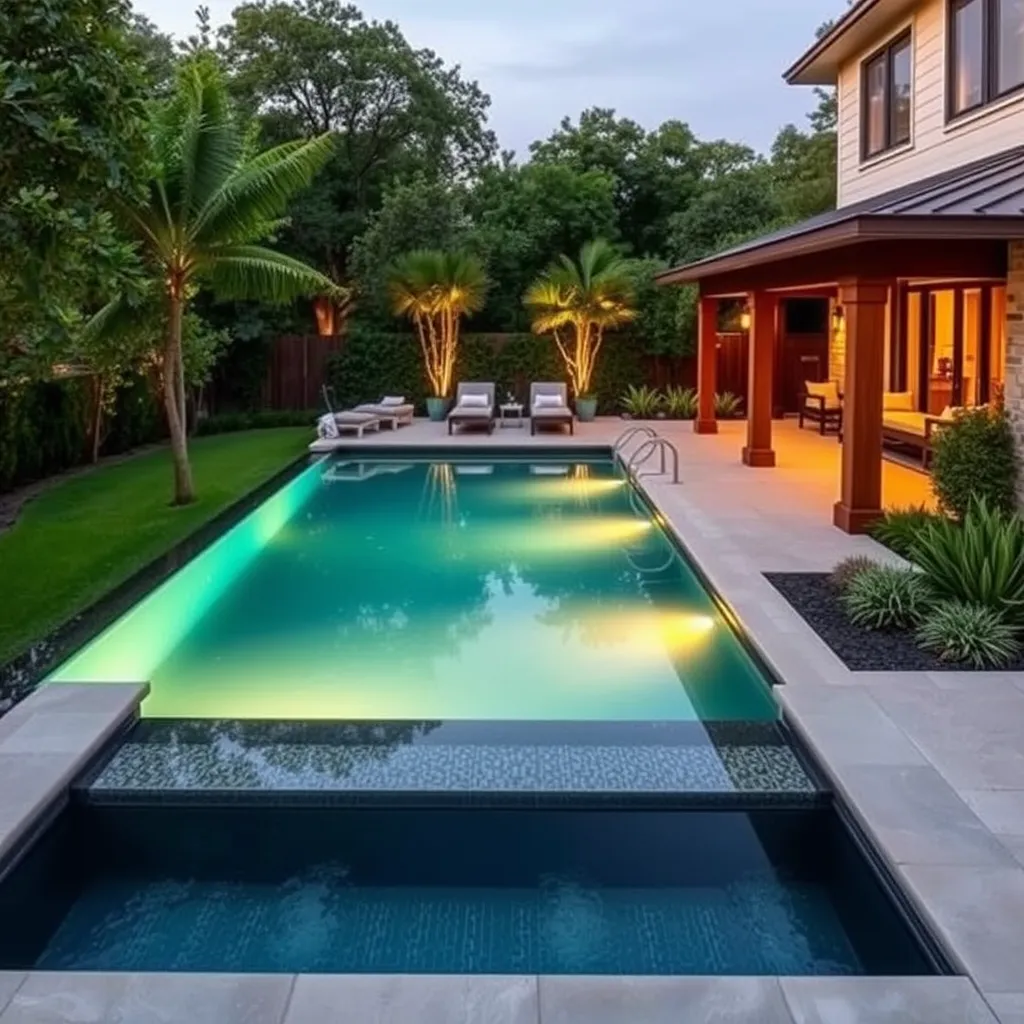
Inground swimming pools are the epitome of backyard luxury, offering a sleek, permanent addition customizable in shape and size with materials like concrete, vinyl, or fiberglass. They are durable and can include features such as waterfalls, spas, and lighting, perfect for relaxation and entertainment. Among the most popular types of pools, in-ground options stand out for their versatility and aesthetic appeal.
2. Above-Ground Pools
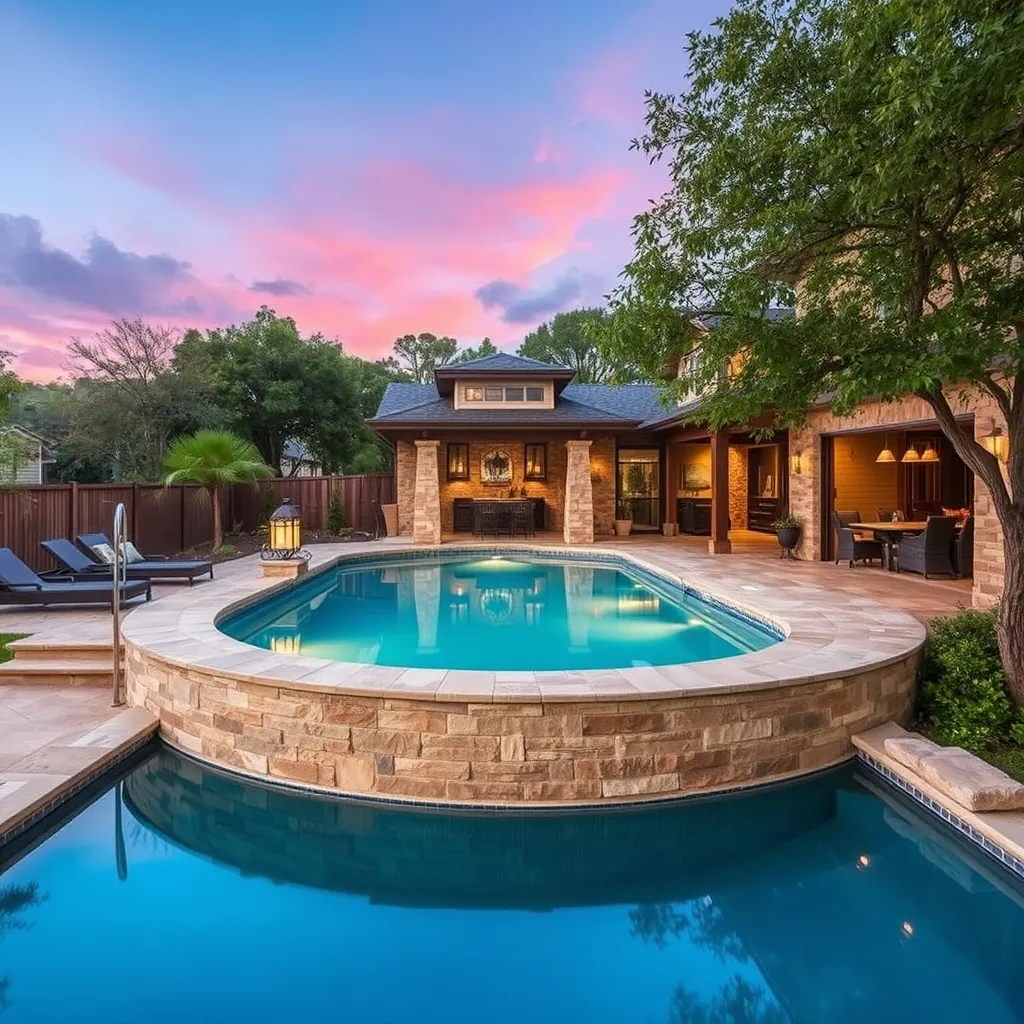
Above-ground pools offer an affordable, flexible alternative to in-ground pools, ideal for budget-conscious families. Made from durable materials like steel or aluminum, they come in pre-fabricated kits for easy DIY assembly and can be disassembled and moved, making them a convenient option for relocations. Enjoy backyard swimming without the hefty price tag!
3. Lap Pools
Lap pools are perfect for fitness enthusiasts, designed for swimming laps and providing an ideal space for rigorous exercise. Their streamlined, rectangular shape suits serious swimmers and fits well in narrow or elongated spaces.
4. Natural Pools
Natural pools are eco-friendly and visually appealing, using plant-based filtration instead of chemicals to create a self-cleaning system. They offer safe swimming, boost backyard biodiversity, and blend seamlessly with garden landscapes for a serene retreat.
5. Indoor Pools
Indoor pools provide year-round swimming, offering privacy and protection from the weather. Perfect for colder climates or dedicated swimmers, they can be tailored to fit larger spaces or basements and are heated for comfort.
6. Plunge Pools
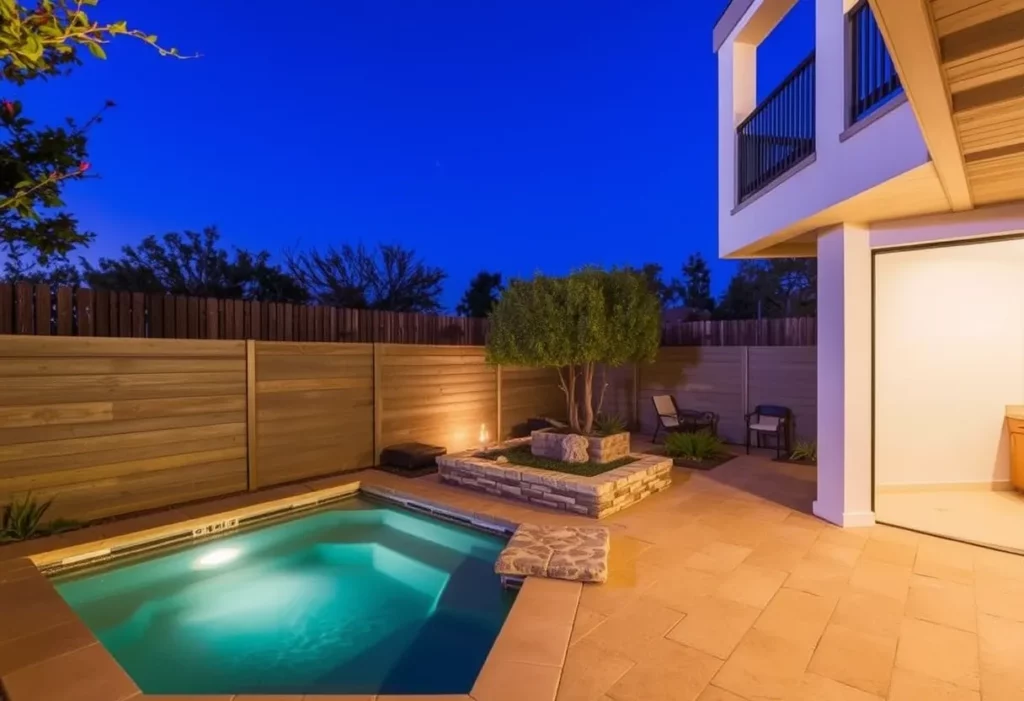
Plunge pools are small, shallow pools perfect for cooling off and relaxing, especially in small backyards or urban areas. They can be enhanced with features like seating, jet spas, and waterfalls to improve the experience.
7. Spa Pools
Spa pools, or hot tubs, provide relaxation and wellness through heated water and massaging jets, ideal for hydrotherapy. Perfect for unwinding or soothing sore muscles, they offer comfort and therapeutic benefits, usable as standalone units or pool enhancements.
Whether you seek luxury, fitness, relaxation, or sustainability, there’s a pool option that can turn your vision into reality. Dive into these backyard pool styles and select the one that best fits your lifestyle and aspirations.
Different Types of Pool Design
When considering the creation of your dream backyard oasis, it’s essential to explore the different styles of pools available. These pool designs not only enhance the aesthetic appeal of your outdoor space but also introduce various functional and recreational features. From artistic forms to modern configurations, let’s dive deeper into some of the most popular pool designs that cater to specific tastes and preferences.
1. Geometric Pools
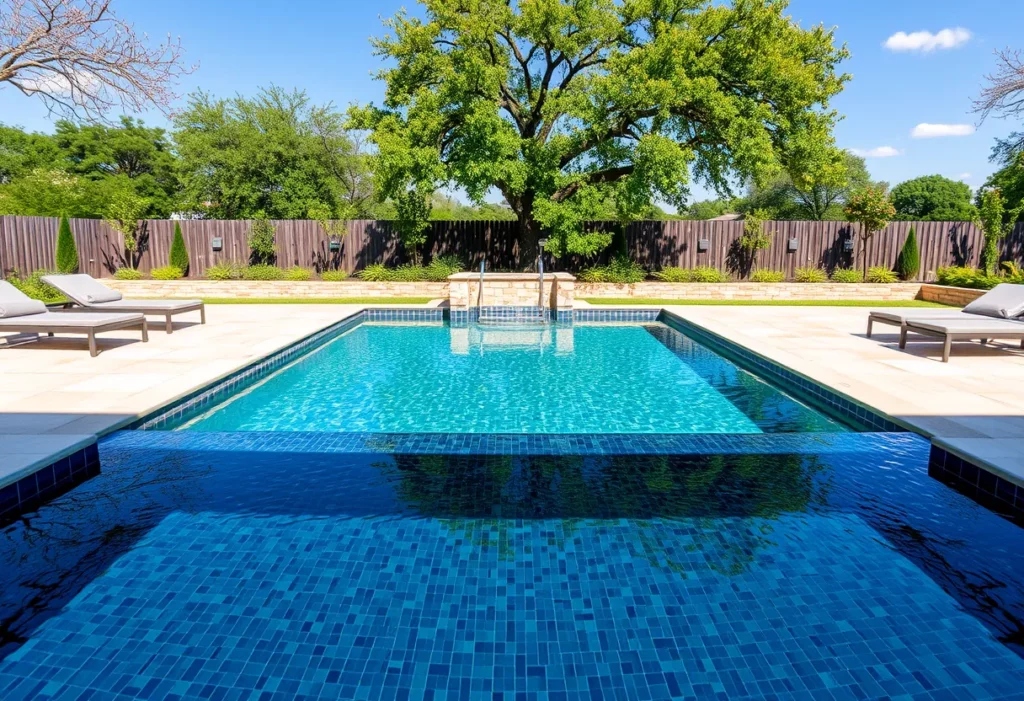
Geometric pools feature clean lines and simple shapes like rectangles and circles, offering a modern look that complements contemporary architecture. With sleek, minimalistic designs using materials like concrete or glass tiles, they provide a sophisticated yet understated vibe, often including features like infinity edges for added drama.
2. Freeform Pools
Freeform pools, characterized by their irregular shapes and natural appearance, blend seamlessly with landscapes featuring rocks, waterfalls, and greenery. They create a tropical, resort-like atmosphere and are versatile enough to fit nearly any backyard size or shape.
3. Infinity Pools
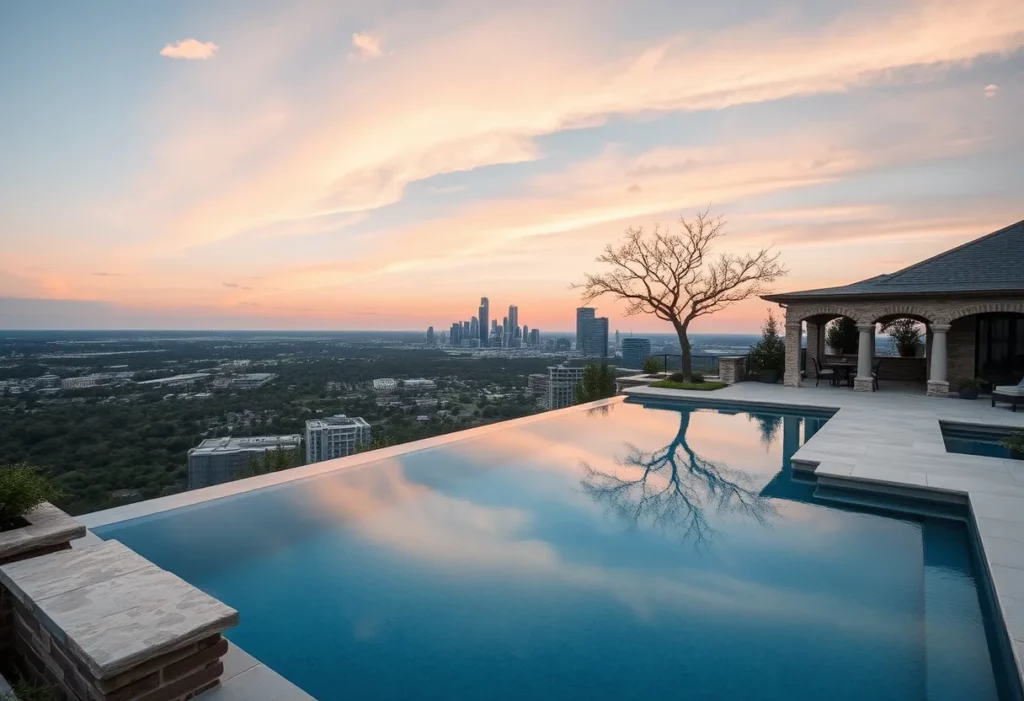
Infinity pools, or vanishing edge pools, create a stunning illusion of water extending endlessly into the horizon by allowing water to flow over the edge into a catch basin. This luxurious design is especially impressive on properties with spectacular views, blending the pool seamlessly with its surroundings.
4. Perimeter Overflow Pools
Perimeter overflow pools are designed to create a stunning visual effect, where the water appears to seamlessly blend with the natural surroundings. This luxurious feature involves water continuously flowing over the pool’s edges into a hidden trough, giving the impression of an endlessly filled pool. Known for their aesthetic appeal and tranquil ambiance, perimeter overflow pools are often seen in high-end residential properties and resorts.
5. Lautner Pools
Lautner pools, also known as knife-edge pools, are characterized by their sharp, minimalist edges where the water level is flush with the pool deck. This design provides a sleek, sophisticated look that complements contemporary architecture. The water gently overflows into a perimeter gutter, creating a mirror-like surface that enhances the pool’s reflective quality.
6. Saltwater Pools
Saltwater pools provide a gentler alternative to traditional chlorine pools by using a saltwater chlorination system. This method produces chlorine naturally, resulting in a smoother swimming experience that’s easier on the skin, eyes, and hair. They also require less maintenance and fewer chemicals, making them a more natural and eco-friendly option.
7. Glass-Walled Pools
For something unique and striking, consider a glass-walled pool. These pools use transparent glass panels, creating an aquarium-like effect where swimmers can be seen from outside. Built with high-strength, clear acrylic, they withstand water pressure while offering a unique perspective. Glass-walled pools are a spectacular statement for luxury penthouses, high-end homes, or commercial spaces.
From the elegance of geometric designs to the natural beauty of freeform pools, and the sophisticated charm of infinity edges to the health benefits of saltwater systems, there’s a multitude of design options to transform your backyard into a personal paradise.
8. Hillside Pools
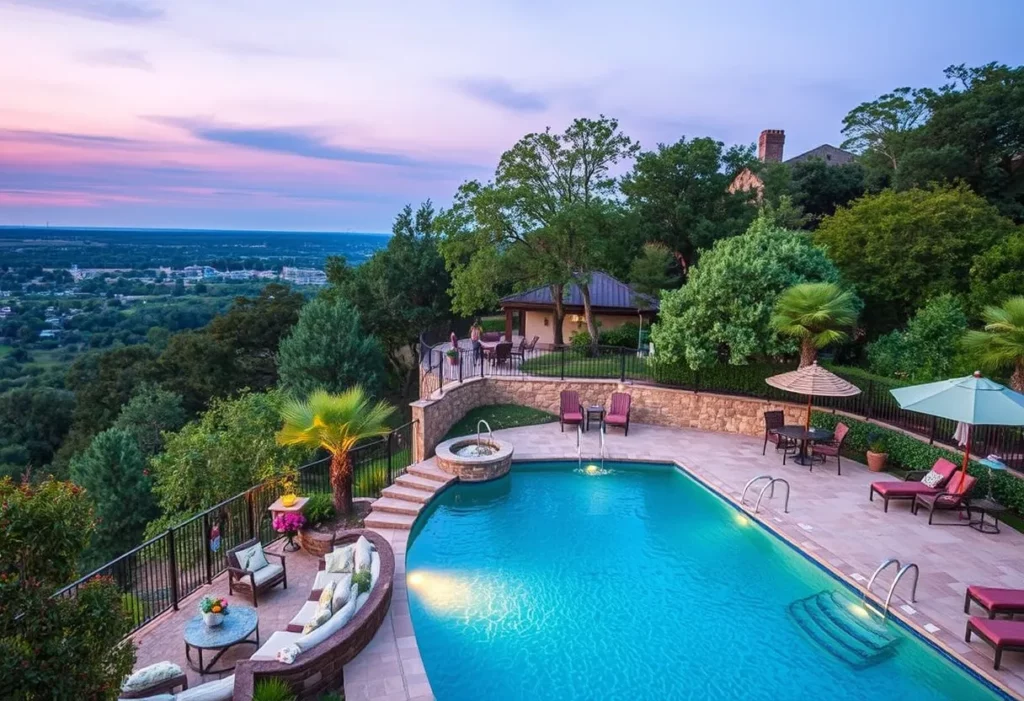
Hillside pools are an ingenious solution for properties located on sloped or uneven terrain, transforming challenging landscapes into stunning aquatic retreats. These pools are designed to blend seamlessly with the natural contours of the hillside, offering a unique and dramatic visual effect. Often incorporating features such as infinity edges, cascading waterfalls, or tiered designs, hillside pools enhance the natural beauty of elevated sites while providing a refreshing swimming experience.
Materials for the Different Types of Inground Pools
When planning to install a pool in your backyard, you inevitably come across the question of “what are inground pools made of?” The inground pool materials chosen for construction significantly impact the pool’s durability, maintenance, and overall feel. Let’s explore some of the most common materials used in inground pool construction:
1. Concrete Pools
Concrete pools, built with reinforced steel and concrete, are highly durable and customizable in shape and size. They can be finished with plaster, pebble, or tile. Although they need periodic resurfacing, their longevity makes them a solid long-term investment.
2. Gunite Pools
Gunite pools are concrete pools made by spraying a mix of cement and sand over a reinforced steel framework. They offer design flexibility, durability, and can be finished with plaster, tile, or pebbles. Popular for their resistance to cracking, they can also include features like waterfalls and built-in seating.
3. Vinyl Pools
Vinyl pools have a flexible liner supported by a concrete or steel frame, available in various patterns and colors for a smooth, luxurious finish. They are quicker and cheaper to install than concrete or gunite pools, but the liner usually needs replacement every 7-12 years.
4. Fiberglass Pools
Fiberglass pools are pre-fabricated shells made from fiberglass-reinforced plastic, installed directly into an excavated hole for quick setup. Their non-porous surface resists algae growth and is easy to maintain. While initially limited in shapes, advancements in manufacturing have expanded design options.
What Type of Pool Is Best for Me?
Choosing the perfect pool for your backyard can be an exciting but overwhelming task. With so many swimming pool options available, where do you even start? Let’s break it down:
First, consider your budget. High-end options like concrete and gunite pools are durable and customizable but can be more expensive and require more maintenance. On the other hand, vinyl and fiberglass pools are often more budget-friendly, quicker to install, and easier to maintain.
Next, think about the design and look you want. If you want a unique, custom look, concrete or gunite pools are flexible in shapes and finishes. If easy maintenance and a smooth surface are your priorities, a fiberglass pool resists algae and is easy to clean. Vinyl pools offer versatile design options with straightforward upkeep, balancing customization and quick installation.
Don’t forget to consider long-term use. If durability is important, especially for decades of enjoyment, concrete or gunite is a solid investment. Families with young children or sensitive skin might find the gentle touch of a saltwater pool appealing.
Whether you are exploring different kinds of pools, keeping these factors in mind will help you make an informed decision.
Key takeaways about the different types of swimming pools
In summary, selecting the right pool for your backyard depends on various factors, including your budget, desired design, maintenance preferences, and long-term use. Here are the key takeaways about swimming pool types:
- Budget Considerations: Concrete and gunite pools are premium options with high durability and customization potential, while vinyl and fiberglass pools offer affordability and ease of installation.
- Design Flexibility: Concrete and gunite pools allow for highly customized shapes and finishes. Fiberglass pools are limited but rapidly expanding in design choices, and vinyl pools strike a balance with versatility in patterns.
- Maintenance Needs: Fiberglass pools are the easiest to maintain due to their non-porous surfaces, followed by vinyl pools, which require periodic liner replacement. Concrete and gunite pools are more maintenance-intensive but are highly durable.
- Usage Longevity: For long-term durability, concrete and gunite pools are solid investments that can last decades with proper care. Vinyl and fiberglass pools offer quicker setups and lower initial costs.
When embarking on a pool installation project, working with experienced professionals can make all the difference. Our Austin pool builders are known for their expertise and commitment to delivering high-quality, custom-designed pools that perfectly match your vision.


